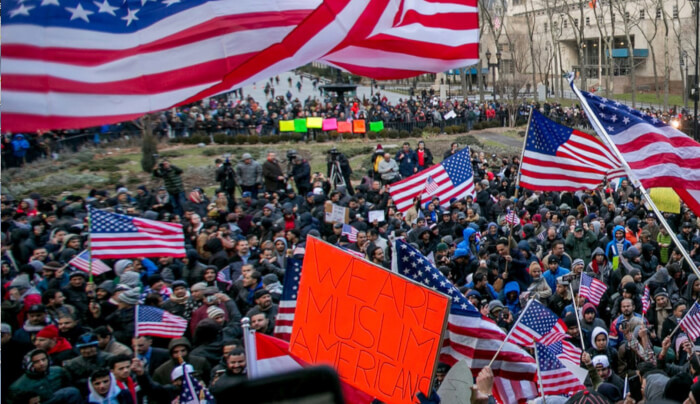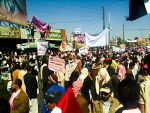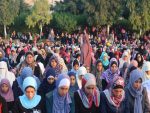Impact of Trump ban on Yemen detailed in new report
The Center for Constitutional Rights (CCR) and the Rule of Law Clinic at Yale Law School released “Window Dressing the Muslim Ban: Reports of waivers & mass denials from Yemeni-American families stuck in limbo.”
The new report documents the impact of Donald Trump’s “Muslim Ban” on Yemeni nationals applying for immigrant visas to rejoin their immediate relatives in the United States, the denial of waivers under the ban, and the resulting hardships inflicted upon Yemenis and Yemeni-Americans.
The authors of the report traveled to Djibouti to obtain first-hand accounts, many of which are included in the report.
The report describes, among other things, the failure of a process that purports to allow for case-by-case waivers to the third iteration of the Muslim Ban on a discretionary basis. It documents pro forma, mass denials of visa petitions and waiver requests, and a process that is mired in chaos and secrecy. A former consular official familiar with the waiver process recently described it as “fraud.”

Only after oral argument before the U.S. Supreme Court on the constitutionality of the ban, during which several Justices inquired about the waiver process, did the number of notices of reconsideration of denials suddenly rise. Advocates say this abrupt change, without any corresponding amendments to the standards for granting waivers, confirms the arbitrariness and opacity of the waiver process.
“Trump has moved the chaos of the Muslim Ban from U.S. airports to U.S. consulates abroad, in an attempt to render the harms invisible – but they are just as devastating,” Center for Constitutional Rights Staff Attorney Diala Shamas. “The Yemeni-American families that we met with in Djibouti, stranded there and separated from their U.S. citizen children or spouses, provided a stark reminder of the many facets of this administration’s attack on immigrant families.”
As a result of the Ban, thousands of U.S. citizens and lawful permanent residents of Yemeni origin remain separated from their families. Many individuals interviewed report that members of their families with different citizenship and immigration statuses remain scattered across multiple countries. Those trapped in Djibouti, amidst the civil war and resulting humanitarian crisis in Yemen, face mounting debt, limited medical and educational opportunities, along with prolonged separation from their loved ones. One person interviewed added that because the consular officers have their passports while they wait, they “are under detention without walls.” Another said, “The waiver is a lie word.”
“Today’s report tells the story of the Yemeni American community’s longstanding struggle and its demand to be treated with dignity and respect,” Said Ibraham Qatabi, a Yemeni American and a senior legal worker at the Center for Constitutional Rights. “Yemeni-American families have been suffering for too long. For years our community has faced systemic discrimination and excessive scrutiny of immigration petitions. Some have been forced to wait more than a decade for family members’ visas. To this often unseen targeting of Yemeni Americans, Trump has now added this discriminatory, and outright ban.”
“I interviewed a few individuals on the same day that they had received their denials from the U.S. consulate. It was moving to hear these individuals suddenly reassess years-long plans to reunite with children and spouses and begin new lives in the United States,” said Rachel Brown, a student at Yale Law School and one of the researchers and authors of the report. “Throughout the interviews, however, I was struck by both the resilience of the Yemeni community in Djibouti, and their faith in the American legal system’s ability to vindicate their rights, even when other branches of government were undermining them.”
Read the report here.
The Center for Constitutional Rights is dedicated to advancing and protecting the rights guaranteed by the United States Constitution and the Universal Declaration of Human Rights. Founded in 1966 by attorneys who represented civil rights movements in the South, CCR is a non-profit legal and educational organization committed to the creative use of law as a positive force for social change. Visit www.ccrjustice.org and follow @theCCR.
====== =====
[Editor’s note: Although Trump’s Presidential Order is described as a “Muslim Ban,” the order ONLY impacts individuals originating from six of 50 predominantly Muslim nations. They are Yemen, Syria, Sudan, Iran, Libya, and Somalia. Not impacted are 44 other predominantly Muslim nations that include Saudi Arabia, Qatar, the UAE, Kuwait, Malayia, Algeria, Bahrain, Brunei, Comoros, Djibouti, Egypt, Iraq, Jordan, Morocco and Lebanon.]


- Israelisnipers shooting and killing hospital workers in Gaza - December 11, 2023
- CAIR Condemns Israeli Executions of Wounded, Unarmed Palestinian in West Bank - December 11, 2023
- Arab and Muslim American voters face a “simple choice” between Biden’s inhumanity and Trump’s edgy politics - December 9, 2023
























